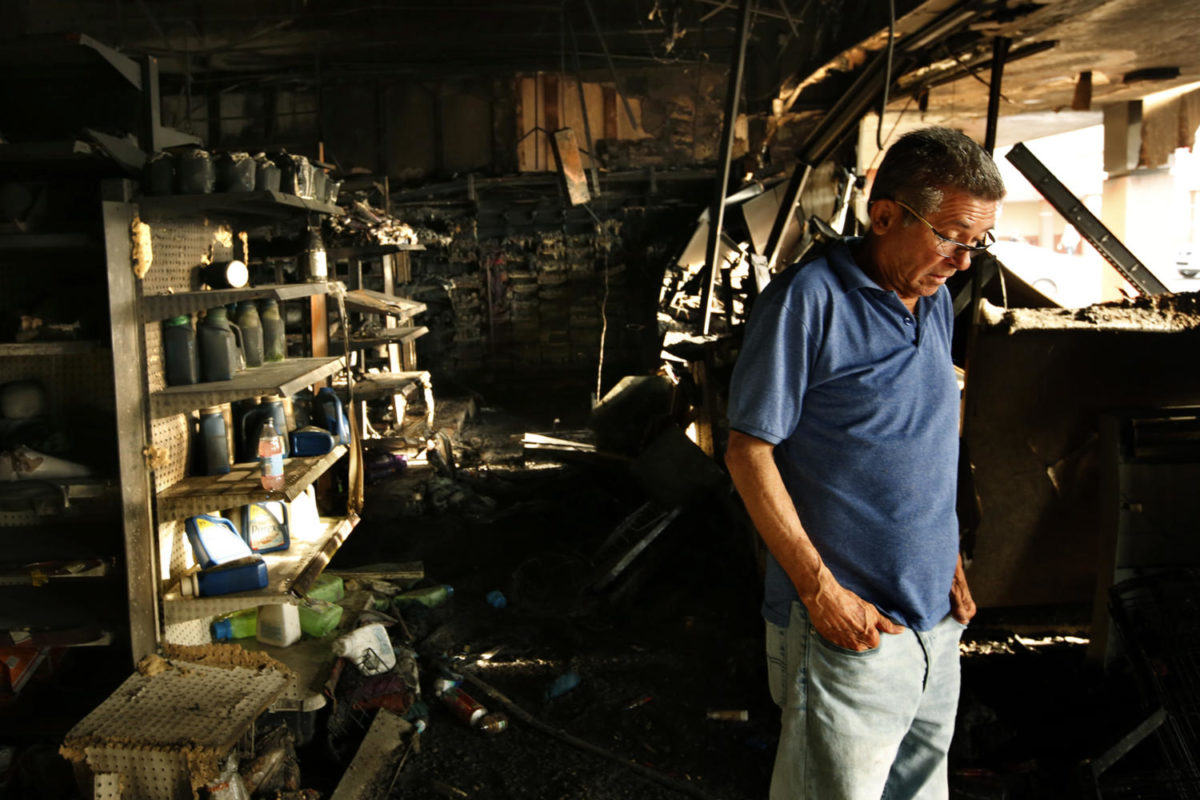Two members of campus deal with aftermath of Hurricane Maria, central Mexico earthquake
Looters targeted a Walgreens in the shopping area where this man owns a cafe shop, shown on Sept. 25, 2017. His cafe was also looted. (Carolyn Cole/Los Angeles Times/TNS)
September 28, 2017
As Hurricane Maria ravaged Puerto Rico last week and left the entire island without electricity, Rene Poitevin tried to reach his mother for days without success.
The storm’s strong winds coupled with massive floods tore through power lines, destroying numerous buildings and disrupting communication on and off the island.
“It was intense,” said Poitevin, coordinator of the Hispanic/Latino Resource Center. “It took me several days to get in contact with my mom.”
Advertisement
When Poitevin was finally able to get ahold of his family Sunday, he felt relief, but said they felt a mixture of other emotions.
“They are frustrated and scared,” Poitevin said. “They have gone through a very intense traumatic experience.”
Poitevin’s family lives in Aguadilla on the northwest side of the island. They, like the rest of the people on the island, found themselves right in the path of a storm that cost at least 16 people their lives, according to local officials.
His family all made it through physically unscathed, but he said they are dealing with massive personal property loss.
“Most of my family lost property that was damaged by the hurricane,” Poitevin said.“It’s really frustrating and sad. Roofs and windows came flying off, completely destroying many of my family’s property.”
Maria also destroyed most of the island’s farms over the weekend, officials say.
“There is no food now,” Poitevin said. “People have to depend on whatever they stored up for now.”
Advertisement*
More than 70,000 residents from cities along the Guajataca River on the island were displaced for fear of the “extremely dangerous” situation, Poitevin said.
Poitevin said the human and financial costs of the catastrophe are just beginning to be known.
“Puerto Rico is already in financial crisis,” he said. “This just further worsens the economic crises that was there,” Poitevin said. “Right now people are just now starting to take inventory of how much the damage is going to cost them.”
Since much of Puerto Rico’s infrastructure was destroyed by the storm, Poitevin said many chose to temporarily move to the U.S. mainland. But he said such a move is not simple.
“Many chose to stay because they have lives built there, their kids go to school there, they have jobs there,” Poitevin said.
Across the island, residents fear power could be out for weeks or even months, which means communication will remain hampered for those trying to reach loved ones, he said.
“The government has prioritized electricity for the hospitals, airports and anything to do with infrastructure,” said Poitevin.
Many towns were left without drinking water, fuel or phone service. Poitevin said insurance is “less institutionalized” in Puerto Rico, meaning that most of the damage would likely be paid for by those who owned the property.
The Federal Emergency Management Agency, which is the agency that provides funds for disaster relief in Puerto Rico, is the main hope for many who don’t have insurance, he said.
Thousands of miles away, Mexico City and its surrounding towns faced devastation last week as a 7.1 magnitude earthquake on Sept. 19 left similar destruction in its wake, leading to 320 deaths and leaving thousands homeless.
Jorge Sida, a senior studying cinema from Chiapas, Mexico, said he frantically tried to contact his family during following the 1 a.m. quake.
“It was bad, I couldn’t get ahold of them on the telephone since the lines were down,” Sida said. “I was very scared and overwhelmed with what was happening, and not being able to find out what was going on.”
After four hours of unsuccessfully trying to reach his family via phone call, he said he eventually made contact on social media and found out they were unharmed.
Unlike Puerto Ricans, who are U.S. citizens and able to move to the U.S. mainland, Mexicans affected by the quake didn’t have the option. This created an amplified fear for Sida, he said.
“It’s difficult not having my family here, and it’s not like they can just come,” Sida said. “But the whole country didn’t get affected so people started moving out further south and north.”
Since the earthquake occurred at the beginning of the semester, Sida said he wasn’t able to return home to be with his family, but he has maintained contact through social media since most of the phones lines were damaged.
“People in affected areas in Mexico are scared to go to bed,” Sida said. “Those going to bed are sleeping with their clothes on, wearing their shoes, to be prepared for another aftershock.”
Since Mexico’s earthquake happened at the same time as Hurricane Maria, Sida said he felt the quake wasn’t given enough attention.
“I feel like it has been overlooked by many maybe because it’s not in their country, or maybe because there is so much going on,” Sida said. “It’s our neighbouring country, so you would expect that people would be more concerned.”
Home owners in Mexico are not required to insure their property, Sida said, which only made the earthquake more destructive.
“Out in the country insurance is not really a thing,” Sida said. “A lot of people did lose property that they are not going to recover.”
Staff writer Francois Gatimu can be reached at [email protected] or on Twitter @frankDE28.
To stay up to date with all your southern Illinois news, follow the Daily Egyptian on Facebook and Twitter.
Advertisement







